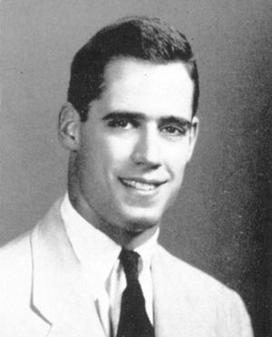The Importance of the Honor Code

Each fall, the entering class is addressed by the Chairman of the Graduate Council and the Chairman of the Undergraduate Honor Committee, each of whom lends the weight of his prestige to the perpetuation of the Honor System. As in generations past, every freshman is generally familiar with the terms of the Honor System before he matriculates and has pledged himself to uphold it. But when the Class first assembles on the Campus, the functioning of the Honor Committee is explained in detail and the devotion of Princetonians to the Honor System is deeply impressed upon the new class. It would be a callous freshman indeed who left this meeting unmoved by a sense of Princeton’s dedication to a principle.
This year, after George E. Clark Jr. ’29 had addressed the Freshmen in behalf of the alumni, Honor Committee Chairman James V. Hurlock ’55 spoke as follows:
“The fact that the President of the National Alumni Association has addressed you concerning the tradition and principles of the Princeton Honor System is, I think, indication enough of the extreme faith with which past generations of Princetonians regard this system. It remains for me as a representative of the Undergraduate Honor Committee to provide for you an understanding of the breadth of the system, its areas of application, methods of operation, and ultimate effects.
“Before I begin with these particulars, it should be made clear that a system of Honor has no actual visible existence. Only in the combined integrities of Princetonians past and present can we understand the meaning of our Honor System, and even then this understanding must come as an acquired respect rather than a verbal definition. Dictionaries testify to their inadequacy by two pages of frenzied explanation. Thus for Princeotn to systematize the apparently indescribable would be, I think you will agree, somewhat presumptuous. Instead we avoid a detailed code of conduct in an effort to preserve the spirit of our Honor System from the cheapening effects of trivial do’s and don’ts. It is our belief that the spirit of the Honor System stands at the top of all other traditions and hence affects all areas of conduct and activity. If this be so, then in truth we may say we have an ‘Honor System.’”
After an exposition of the functioning of the Honor Committee, Mr. Hurlock turned to the necessity of reporting violations.
“We regard this situation in quite a different light from the ordinary idea of ‘ratting on your friend.’ Princeton University is a community where a man’s honor is respected, not questioned. We believe this atmosphere is the one most conducive to the development of strong qualities of character and fortitude. Unfortunately every community includes a very small number of people who have not as yet discovered the meaning of personal integrity or who will not respect honorable qualities of conduct in their fellow men. It is our hope that the aforementioned discovery can be made at Princeton, but if it cannot, then this environment is perhaps the most detrimental to a man who has this lesson to learn. Therefore we ask you to report violations in order first that we may preserve the principles we have agreed to live by and second in order that the individual may learn his lesson in an academic community rather than in the courts of the land….The success of the Honor System is dependent on your support of both these stipulations.
“In conclusion, then, each of us here tonight must consider it a privilege, not a right, to be attending Princeton. Our Honor System is a way of life to which we all have agreed to adhere….You, the Class of 1958, are inheriting these ideals and you must assume your share of the responsibility for the preservation of this tradition.”
This was originally published in the October 15, 1954 issue of PAW.











No responses yet